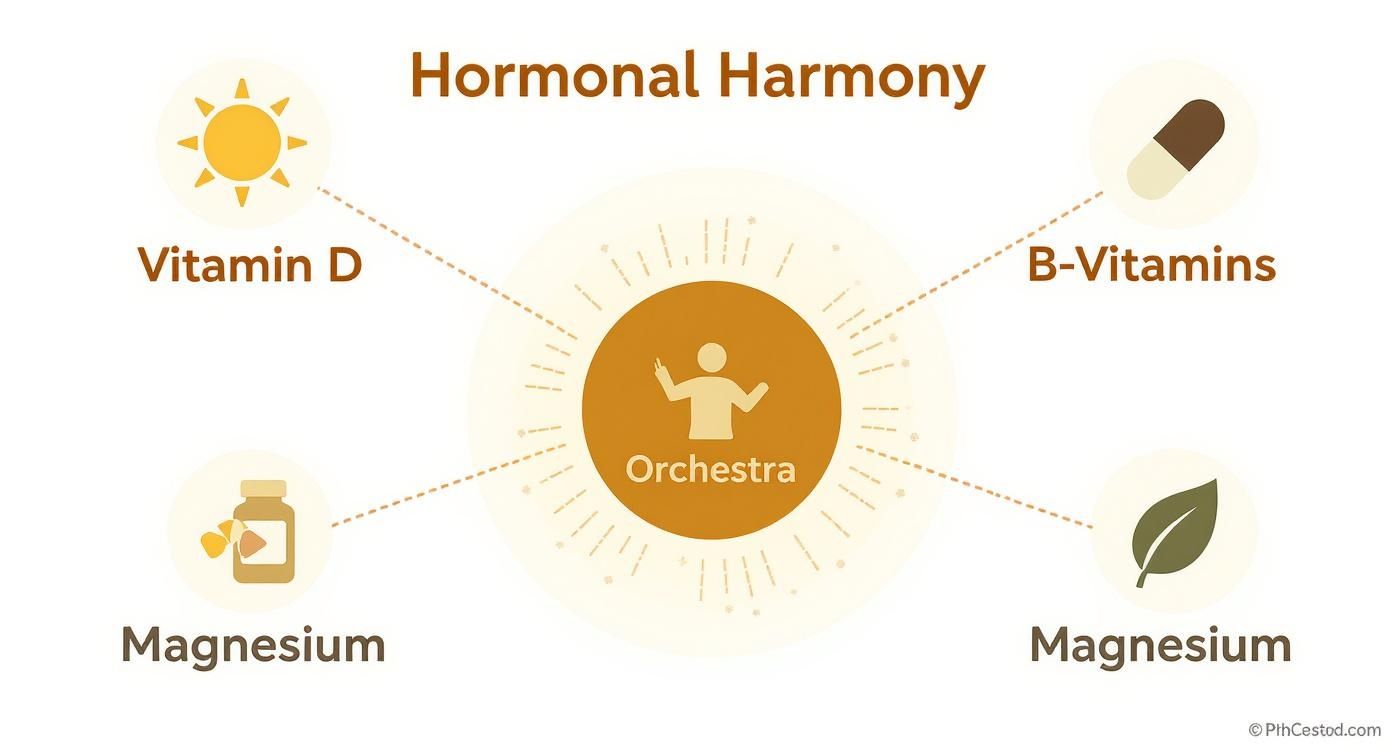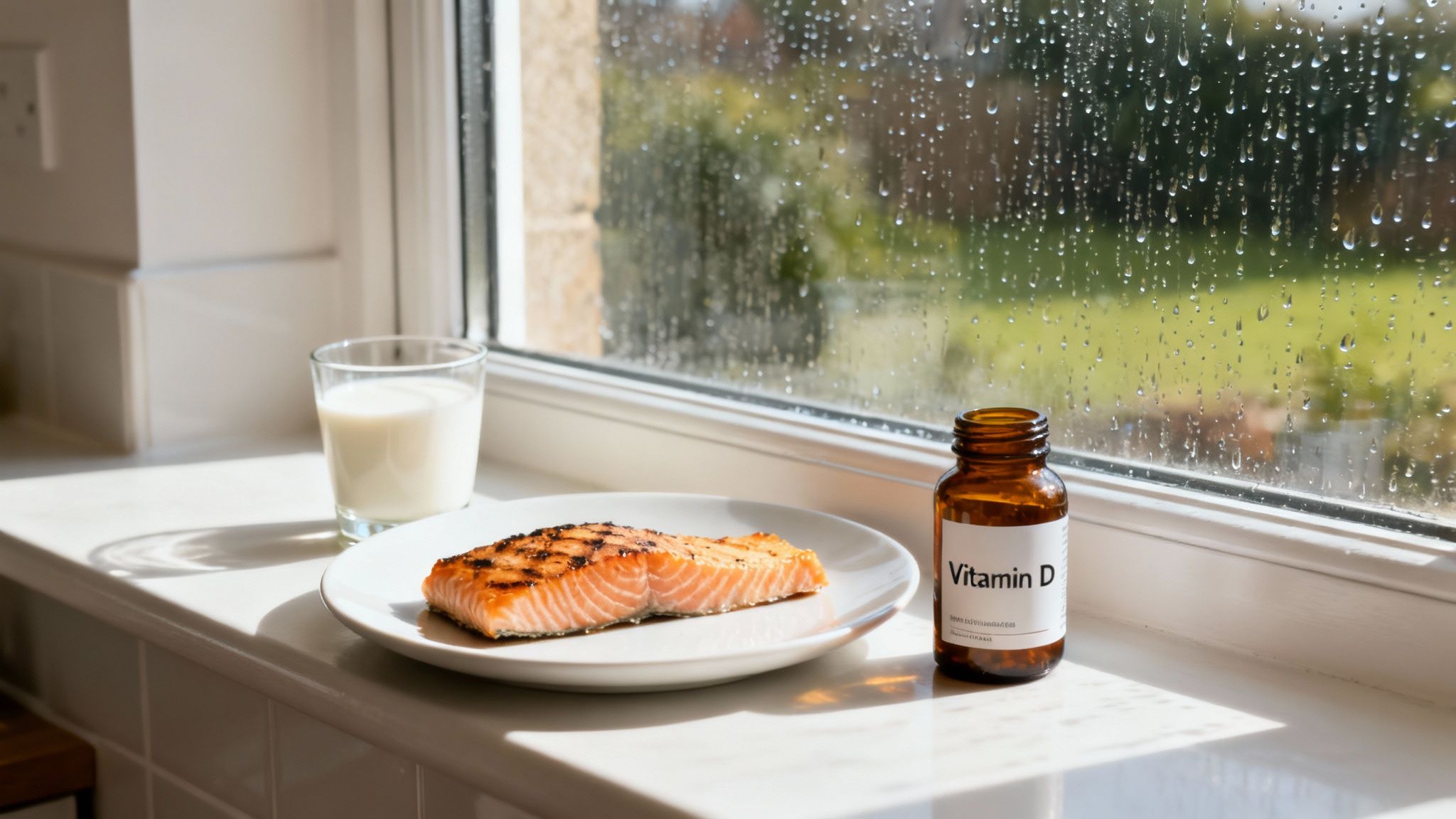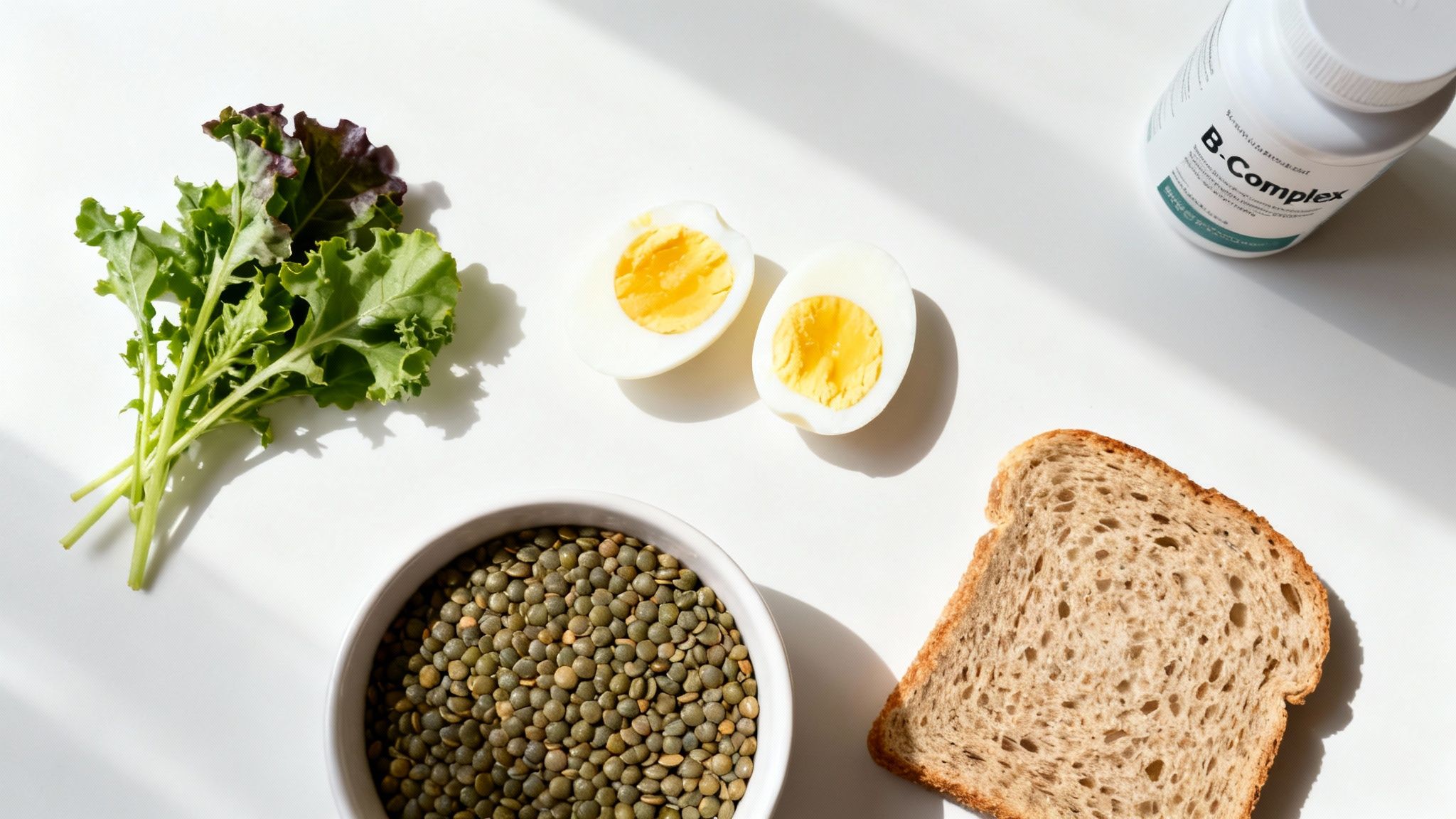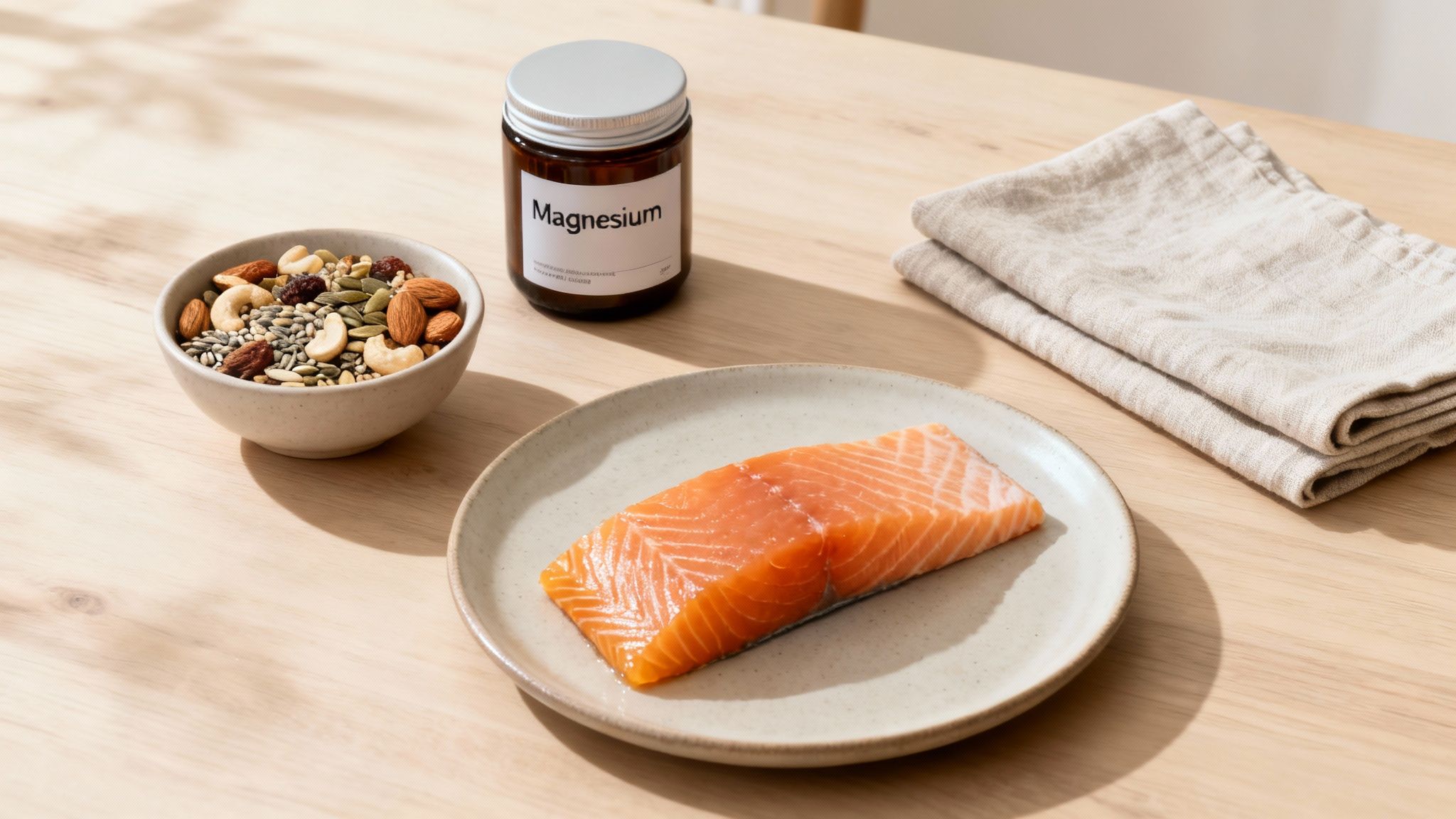
Vitamins Balance Female Hormones: A UK Guide
Share
Yes, certain vitamins are fundamental for keeping your hormones in check, helping your body both produce and regulate them properly. Think of key players like Vitamin D and the B-vitamin family as the essential building blocks and messengers for your endocrine system. They have a direct hand in everything from your menstrual cycle to your mood and energy levels.
Your Guide to Hormonal Harmony
Feeling like your hormones are running the show is an all-too-common experience. Whether it's mood swings, crushing fatigue, or cycles that are all over the place, the ripple effects of a hormonal imbalance can really throw your daily life off course. But the good news is, the solution might be closer than you think—often starting right on your plate.
Imagine your hormones as a complex orchestra. When every instrument is perfectly in tune, the result is beautiful harmony. But if just one is out of key, the whole symphony sounds off. Specific vitamins and minerals are like the skilled conductors, making sure every section plays its part exactly when it should. This guide is all about those conductors—the most important nutrients for female hormonal health. We’ll get into what they do and how they help your body find its natural rhythm.
The Foundation of Wellness
Before we get into the specifics, it’s helpful to see hormonal balance as just one piece of a much bigger wellness puzzle. A great way to understand this is by exploring holistic healing approaches, which connect the dots between mind, body, and overall health. This broader perspective helps you see how nutrition works together with other factors like stress management and sleep.
For women here in the UK, some nutritional gaps are especially common and can really take a toll. Take Vitamin D, for example. Deficiency is alarmingly widespread, mostly because we don't get enough sun, particularly in the winter months. Research using UK Biobank data revealed some stark figures: over 50% of Asians and more than a third of Black Africans in Britain are severely deficient.
Even among the general UK population, around 60% have insufficient levels. That's a troubling statistic, especially when you consider just how crucial vitamin D is for hormonal function. You can read the full study about UK vitamin D levels and their health impact for a deeper dive.
This guide is designed to give you a practical plan to tackle these challenges head-on and support your body from the inside out.
Let's take a step back and look at the bigger picture: your body's incredible hormonal system.
Think of hormones like oestrogen, progesterone, and cortisol as a team of highly skilled messengers. They’re constantly zipping around your body, sending signals that manage almost everything – from your mood and energy right down to the rhythm of your menstrual cycle.
When this chemical communication network is flowing smoothly, you feel fantastic. You’re vibrant, balanced, and ready for anything. But when things get out of sync, whether it’s from stress, diet, or just life, you start to feel it. That’s when the frustrating symptoms pop up, like feeling exhausted all the time, unpredictable mood swings, or periods that are all over the place.
This is exactly why certain vitamins are so powerful. They act as the essential support crew for these hormonal messengers, making sure they’re created properly, delivered where they need to go, and then cleared out once their job is done.
The Key Players in Your Endocrine System
Your endocrine system is the group of glands responsible for producing and releasing all these vital hormones. For women's health, the main players are the ovaries (which produce oestrogen and progesterone), the adrenal glands (managing your stress response with cortisol), and the thyroid gland (your metabolism's master controller).
Each hormone has its own specific job, but they all influence one another in a delicate dance. For example, if you’re under constant stress, your cortisol levels can stay chronically high. This can directly interfere with the delicate balance between oestrogen and progesterone, leading to classic symptoms like PMS and cycle irregularities. It’s all connected, which is why a holistic approach that includes targeted nutrition works so well.
This infographic gives a great visual of how key vitamins act like conductors in your body's hormonal orchestra, ensuring every instrument plays in perfect harmony.
As you can see, nutrients like Vitamin D, the B vitamins, and Magnesium are absolutely central to maintaining that delicate balance we need for overall wellbeing.
A well-regulated hormonal system is the bedrock of female health. It influences not just reproductive function but also mental clarity, emotional stability, and long-term vitality. Supporting it with the right nutrients is a non-negotiable part of self-care.
Of course, major life stages can also bring on big hormonal shifts. To get a better sense of how these changes, especially during menopause, can affect things like weight, it’s worth reading up on Understanding Menopause Weight Gain Causes. Grasping that connection really drives home just how important nutritional support is through every phase of life.
Now that we’ve covered the basics, let’s dive into the specific vitamins that can help keep your hormonal symphony playing beautifully.
The Sunshine Vitamin Your Hormones Rely On
We often hear about Vitamin D in the context of strong bones, but its role goes so much deeper than that. Think of it less like a simple vitamin and more like a master key for your entire hormonal system. In fact, it's technically a pro-hormone, a substance your body cleverly converts into a hormone. This unique function allows it to directly influence things like oestrogen production and even help regulate the very neurotransmitters that govern your mood.
When your Vitamin D levels are where they should be, your body's hormonal communication network just runs more smoothly. But for women in the UK, this is a huge challenge. Our infamous lack of sunshine, especially during those long, grey autumn and winter months, means our bodies simply can't produce enough of it on their own.
This isn't just a minor inconvenience; it's a major factor affecting female health right across the country. Where you live and the time of year have a massive impact on your vitamin D status, with deficiency rates soaring in winter and the further north you go. A UK Biobank study confirmed that deficiency was consistently higher in spring, winter, and in northern regions, all thanks to the UK’s limited UVB exposure. For instance, women in Scotland showed the lowest levels, putting them at a higher risk. You can dive into the full research on UK vitamin D deficiency patterns to see just how widespread this issue is.

How To Top Up Your Vitamin D
So, what's the plan? While sunshine is always the best source, we can't exactly rely on it. That’s where diet and smart supplementation come into play. Zeroing in on key vitamins to balance female hormones, starting with Vitamin D, is a practical and powerful first step.
Getting more from your diet can certainly help, though it's tough to hit your target from food alone. Good options to add to your shopping list include:
- Oily Fish: Think salmon, mackerel, and sardines. They're packed with it.
- Egg Yolks: An easy and effective way to get a little boost.
- Fortified Foods: Keep an eye out for products in the UK with added Vitamin D, like cereals, plant-based milks, and some yoghurts.
Because getting enough Vitamin D from sunlight and food is so tricky in the UK, the government now recommends that everyone should consider taking a daily supplement containing 10 micrograms (400 IU) during the autumn and winter.
This official advice really drives home how vital supplementation is for keeping your hormones stable all year round. A consistent intake helps you avoid those dramatic dips in Vitamin D that can leave you feeling drained, down, and hormonally all over the place. Consider it your non-negotiable insurance policy against the British weather, making sure your body has what it needs to keep your hormonal orchestra playing in perfect harmony.
The B Vitamin Family: Your Stress and Energy Allies
If Vitamin D is the master key for your hormonal system, then the B vitamin family is the dedicated support crew working tirelessly behind the scenes. This group of vitamins—especially B6, Folate (B9), and B12—are your allies in the fight against stress and fatigue. They play a massive role in keeping your energy stable and managing those all-too-familiar PMS symptoms.

Think of B vitamins as the spark plugs for your body's engine. They're essential for converting the food you eat into usable fuel, which is exactly why a deficiency can leave you feeling completely drained and sluggish. But their magic for hormonal harmony goes way beyond just energy.
Mood Lifters and Hormone Detoxifiers
One of the most important jobs of the B vitamin family is helping your body create mood-boosting neurotransmitters, like serotonin and dopamine. These are the natural brain chemicals that help you feel happy and relaxed. A good supply of B vitamins, particularly B6, ensures your brain has all the building blocks it needs to maintain a positive outlook—a real game-changer during the premenstrual phase.
On top of that, B vitamins are crucial for your liver. Your liver has the massive task of processing and clearing out excess hormones, including oestrogen. When nutrients like Folate and B12 are on board, your liver can perform this detoxification process efficiently. This prevents the build-up of oestrogen that can lead to symptoms like bloating, heavy periods, and irritability. Using vitamins to balance female hormones, like a B complex, is a fantastic strategy to support this vital process.
By aiding in neurotransmitter synthesis and liver detoxification, B vitamins provide a powerful two-pronged approach to managing mood swings and physical PMS symptoms, making them indispensable for a smoother monthly cycle.
Finding Your B Vitamin Sources
Thankfully, getting enough of these essential nutrients is pretty straightforward, as they’re found in a wide variety of common foods. To boost your intake, try to work these into your regular meals:
- Leafy Greens: Spinach and kale are brilliant sources of folate (B9).
- Eggs: A nutritional powerhouse, egg yolks are rich in B12 and B6.
- Legumes: Lentils, chickpeas, and beans are packed with various B vitamins.
- Animal Proteins: Meat, poultry, and fish are excellent sources of B12.
During particularly stressful times, your body’s demand for B vitamins can shoot up. This is when a high-quality B-complex supplement or a comprehensive multivitamin can be a lifesaver, acting as a safety net to ensure your levels stay where they need to be. It’s all about making sure your body has the resources it needs to handle stress and keep your hormones happy.
Magnesium and Omega-3: The Calming Duo
While vitamins D and B often steal the spotlight, two other nutritional heroes work quietly in the background to restore calm and balance to your hormonal system: magnesium and Omega-3 fatty acids.
Think of this pair as your body's natural relaxation and anti-inflammatory team. They are absolutely essential for navigating the monthly ebbs and flows with a bit more ease and a lot less stress.

Magnesium, in particular, acts like a gentle brake on your body's stress response. It helps to regulate your primary stress hormone, cortisol, preventing it from running wild and disrupting your delicate hormonal symphony. This calming effect is precisely why a lack of magnesium is often linked to increased anxiety, menstrual cramps, and poor sleep—all things that can throw your hormones further out of sync.
At the same time, Omega-3s are the champions of soothing inflammation. The powerful anti-inflammatory properties of these healthy fats help calm the processes that lead to period pain and support the overall health of your endocrine system. This makes them a key part of using vitamins to balance female hormones.
Harnessing the Power of Magnesium
Magnesium is a true powerhouse, involved in over 300 biochemical reactions in the body, many of which are critical for hormonal health. It supports the nervous system, promotes muscle relaxation (a huge help for easing menstrual cramps), and is vital for producing the sleep hormone, melatonin. As we know, better sleep translates directly to better hormonal regulation.
By helping to lower cortisol and support restful sleep, magnesium provides a foundational level of calm that allows other hormones, like oestrogen and progesterone, to communicate more effectively without the constant interruption of stress signals.
To boost your intake, focus on magnesium-rich foods like:
- Leafy Greens: Spinach and Swiss chard are excellent choices.
- Nuts and Seeds: Almonds, pumpkin seeds, and cashews are packed with it.
- Dark Chocolate: A delicious (and welcome) way to top up your levels.
Supplementing with magnesium can be incredibly effective, but timing can make a real difference. To learn more, check out our guide on the best time to take magnesium for optimal benefits.
Embracing Anti-Inflammatory Omega-3s
Omega-3 fatty acids are essential fats your body can't produce on its own, meaning you have to get them from your diet. They are celebrated for their ability to combat inflammation, which is a major driver of hormonal imbalance and painful periods.
By reducing that underlying inflammation, Omega-3s help create a healthier internal environment where your hormones can finally function at their best.
Make sure you're incorporating these sources into your diet:
- Oily Fish: Salmon, mackerel, and sardines are the richest sources.
- Flaxseeds and Chia Seeds: Plant-based powerhouses of Omega-3s.
- Walnuts: A fantastic snack that supports both brain and hormone health.
By combining the calming force of magnesium with the anti-inflammatory power of Omega-3s, you create a robust support system for hormonal harmony. This duo works together to reduce stress, ease pain, and promote the overall stability your body needs to truly thrive.
Creating Your Personalised Hormone Balance Plan
Right, so we've covered the what and the why. Now for the most important part: putting all this knowledge into action. Creating a plan that’s tailored to you doesn’t have to be a massive, complicated chore. It’s really just about making smart, consistent choices that add up over time to give your hormones the support they need.
The best way to start is by taking an honest look at your current routine. Grab a notebook and keep a simple food and lifestyle diary for a week. Jot down what you're eating, what your sleep is like, and how your energy and mood are tracking. This isn't about being perfect or judging yourself—it's just about gathering a bit of data to see where the gaps might be.
Assessing Your Current Routine
Once you've got your week-long diary, have a sit-down and ask yourself a few key questions. Are you getting a good mix of colourful vegetables and leafy greens for those B vitamins? Are you managing to eat oily fish, nuts, or seeds a couple of times a week to top up your Omega-3s and magnesium? And how much time are you really spending outside in the sun?
This simple review is brilliant because it helps you pinpoint where small tweaks can have the biggest impact. You might suddenly realise you hardly ever eat magnesium-rich foods, or that your B vitamin intake is seriously lacking on stressful days. Think of it as creating your personal roadmap for feeling better.
Your body is completely unique. A personalised plan is your chance to ditch the generic advice and create a strategy that genuinely works for your specific needs and lifestyle.
Integrating Smart Supplementation
Your diet is always the foundation, but let's be realistic—supplements can offer brilliant, targeted support right where you need it most. When you're choosing vitamins to balance female hormones, look for high-quality products with clear, honest labelling. It's also worth checking for bioavailability; some forms, like magnesium glycinate or methylated B vitamins, are simply easier for your body to absorb and use.
You don't need to go all-in at once. Start with one or two key supplements based on what you've noticed from your diary—maybe it's Vitamin D to get you through the UK winter, or a solid B-complex to help you handle stress. A good multivitamin can cover multiple bases at once.
Ultimately, the goal is to combine a nutrient-packed diet with smart, targeted supplementation and a few mindful lifestyle habits. That’s the most sustainable path to feeling great long-term. Of course, if your symptoms are severe or just won't budge, it's always best to have a chat with a healthcare professional for personalised advice and to rule out anything more serious.
Got Questions? We’ve Got Answers
Stepping into the world of supplements can feel a bit overwhelming, and it's totally normal to have a few questions. Let's clear up some of the most common ones about using vitamins to get your hormones back on track.
Can't I Just Get Everything I Need From My Diet?
In a perfect world, yes. A brilliant, whole-food diet is always your first port of call. But the reality is, it can be tough to consistently hit the optimal levels of every single nutrient your body is crying out for.
Modern life throws a few spanners in the works. Things like depleted soil quality, individual dietary choices, and high-stress lifestyles all ramp up your body's demand for nutrients, often beyond what your plate can provide. For many of us here in the UK, just getting enough Vitamin D from sunlight and food is a real struggle. Think of a great multivitamin as your nutritional safety net—it's there to catch you and fill in any gaps, ensuring your hormones get the consistent support they need.
How Long Will It Take to Actually Feel a Difference?
Patience is a virtue here. Rebalancing your hormones is a marathon, not a sprint, and it doesn't happen overnight. Some women notice a welcome lift in their mood or energy levels within a few weeks, which is fantastic. But for more significant shifts—like a more regular cycle or fewer PMS symptoms—you'll likely need to give it up to three months of consistent use.
The real magic is in consistency. Your body needs that steady stream of nutrients to top up its reserves and gently nudge your delicate hormonal symphony back into tune.
Are There Any Vitamins I Need to Be Cautious About?
Absolutely. It’s smart to be mindful of what you’re taking, especially with the fat-soluble vitamins: A, D, E, and K. Because your body stores these, they can build up over time. It's really important to stick to the recommended daily amounts unless you've been specifically told otherwise by a healthcare professional.
Always have a good read of the label for dosage instructions. And if you have any underlying health conditions or are on medication, it's non-negotiable—have a chat with your doctor or a registered nutritionist before adding any new supplements to your routine.
This article is for informational purposes only and is not medical advice. Always consult a qualified health professional before starting any new supplement or major lifestyle change.
